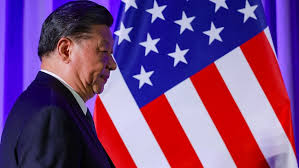
Beijing has hit back against the United States with a fresh round of economic measures following President Donald Trump’s decision to impose 10% tariffs on Chinese imports. The Chinese government announced new duties on key U.S. exports, including coal, liquefied natural gas, crude oil, and automobiles, effective February 10.
China’s Ministry of Finance imposed a 15% tariff on some coal and natural gas products, while large vehicles, agricultural machinery, and crude oil will face a 10% duty. In addition, the Ministry of Commerce and China’s customs administration introduced export controls on over two dozen metal products and technologies, including tungsten and tellurium, both critical for industrial and defense applications.
Further escalating tensions, China placed two major U.S. companies—biotech firm Illumina and fashion giant PVH Group, owner of Calvin Klein and Tommy Hilfiger—on its “unreliable entities list,” citing alleged violations of market trading principles. PVH has denied the accusations and vowed to cooperate with Chinese authorities.
Meanwhile, China’s market regulator launched an investigation into Google for alleged anti-monopoly violations. Although Google has limited operations in China due to censorship laws, this move signals Beijing’s willingness to push back against U.S. corporate interests.
The latest trade actions come in response to Washington’s broad-based tariff policy, which also includes duties on Mexican and Canadian goods. While Trump has temporarily suspended tariffs on Mexico and Canada following diplomatic talks, his administration remains firm on its China stance. The White House insists the tariffs are part of efforts to curb illegal immigration and fentanyl trafficking, a claim Beijing has strongly rejected.
China’s commerce ministry has filed a complaint with the World Trade Organization (WTO), arguing that the U.S. measures “undermine global trade stability.” Analysts believe Beijing’s response is calibrated to send a message while avoiding severe economic fallout. The new tariffs affect about $20 billion worth of U.S. imports, significantly less than the $450 billion in Chinese goods targeted by the U.S.
As tensions escalate, the possibility of a prolonged trade war looms. However, Trump has hinted at potential talks with Chinese President Xi Jinping, raising speculation that a new trade deal could be on the horizon. Both nations face economic pressures, with China grappling with a slowing economy and the U.S. focused on balancing trade and national security concerns.
For now, markets remain cautiously optimistic. Asian stock indices responded positively to the news, with Hong Kong’s Hang Seng Index jumping 2.8%. U.S. markets remained relatively stable ahead of potential negotiations between the two economic superpowers.
Whether this latest dispute will spiral into another full-scale trade war or lead to renewed diplomatic engagement remains to be seen.








